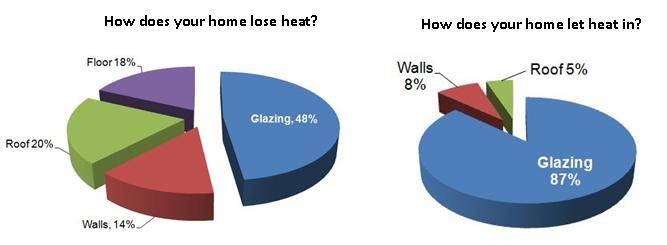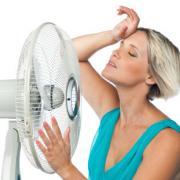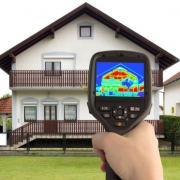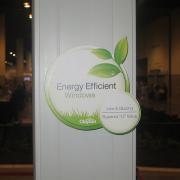High Performance Glass: Human comfort and Energy Consumption.
Electricity prices have skyrocketed over the last few years and many of us have started to feel the pinch. Surveys have shown that many families have been putting off going to the doctors and even resorted to skipping meals in order to stretch the weekly budget further.
With power bills expected to rise by more than 20% over the next two years, it is time to start thinking about what we can do to reduce our household energy consumption and lower our bills.

Over the summer months, air conditioners can contribute to over 50% of our electricity usage. Then when winter comes around, we rely on heating to keep our families comfortable.
In summer, ordinary windows absorb heat from the sun and re-radiate it into your home. In winter they work the other way by absorbing the heat from your home and re-radiating it to the outside.
Did you know that choosing the right glass for your windows can dramatically decrease your energy consumption and lower your annual bill?
High performance glass is a great way to improve your homes energy efficiency and there are a wide array of options available when it comes to choosing which windows and glass doors are right for your home.
Tinted Glass:
There are quite a few benefits that tinted glass offers over regular glass. It can help control heat from the sun radiating into your home and also reduce the glare. In addition to this, tinting is effective in adding privacy to your home and can also increase its value when the time comes to sell.
Double Glazed Glass:
Double glazed windows are a popular choice, not only for energy efficiency but also to help reduce noise from the outside and add strength to your glass. Double glazing is achieved by using a layer of air or gas between two panels of glass. The space can range between 6- 20mm but the best choice for energy efficiency would be to choose double glazing with a space between 10-20mm.
Low E Glass:
Compared to ordinary glass, Low E glass can reduce the amount of heat that is re-radiated into your home but up to 30%. It is also effective in eliminating glare and because it reduces UV rays from penetrating through your windows, it prevents your inside furnishings from fading in the sunlight.
It is not only the glass that has an effect on your windows energy efficiency. The materials you choose for your window frames can have a huge impact on how well your glass performs.
Traditionally window frames were either made out of aluminium or timber, which both have their drawbacks.
Aluminium can conduct the heat and transfer it into your home. In colder climates aluminium frames can cause moisture to build up which encourages dampness and mould in your home.
Timber frames were a popular choice in the past from a visual perspective but as with aluminium, timber has a few flaws when it comes to being energy efficient. Moisture can cause timber window frames to rot and warp, which in turn can leave gaps around your windows, resulting in air getting in.
UPVC (Unplasticised Polyvinyl Chloride) is an extremely cost effective and energy efficient option when it comes to window frames. It is highly durable and comes in a huge range of colours and design options.
Many people don’t realise the importance of making an informed decision when it comes to windows. While it may be tempting to go with the cheaper option now, in the long run it could end up costing you a whole lot more in electricity usage.
Do your research and decide which glass is the best option for your home or business. You will be glad you did.








